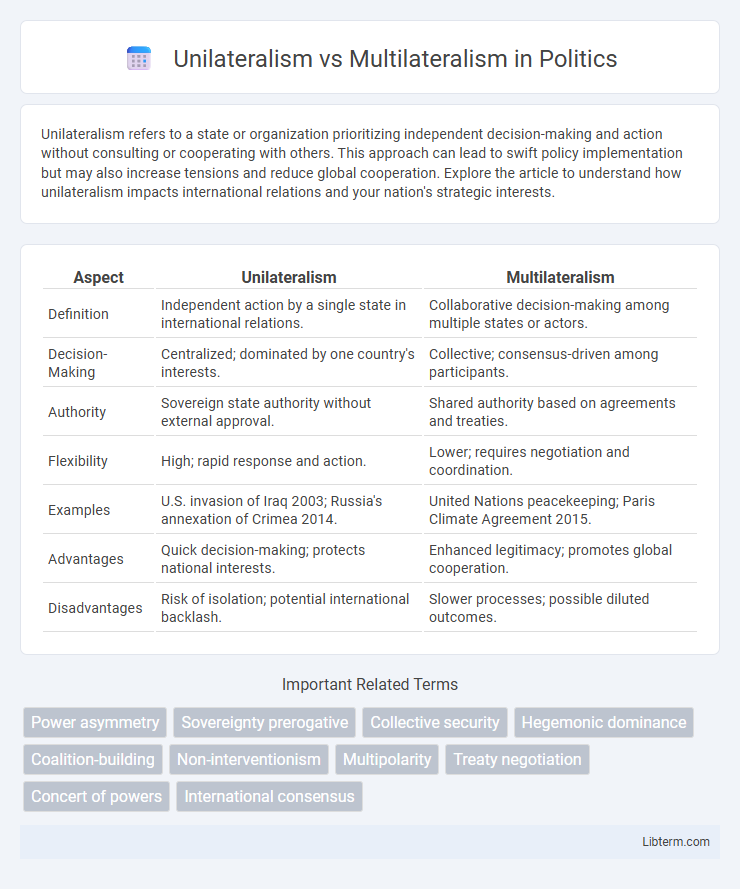Unilateralism refers to a state or organization prioritizing independent decision-making and action without consulting or cooperating with others. This approach can lead to swift policy implementation but may also increase tensions and reduce global cooperation. Explore the article to understand how unilateralism impacts international relations and your nation's strategic interests.
Table of Comparison
| Aspect | Unilateralism | Multilateralism |
|---|---|---|
| Definition | Independent action by a single state in international relations. | Collaborative decision-making among multiple states or actors. |
| Decision-Making | Centralized; dominated by one country's interests. | Collective; consensus-driven among participants. |
| Authority | Sovereign state authority without external approval. | Shared authority based on agreements and treaties. |
| Flexibility | High; rapid response and action. | Lower; requires negotiation and coordination. |
| Examples | U.S. invasion of Iraq 2003; Russia's annexation of Crimea 2014. | United Nations peacekeeping; Paris Climate Agreement 2015. |
| Advantages | Quick decision-making; protects national interests. | Enhanced legitimacy; promotes global cooperation. |
| Disadvantages | Risk of isolation; potential international backlash. | Slower processes; possible diluted outcomes. |
Understanding Unilateralism: Definition and Key Features
Unilateralism refers to a state's approach to international relations where decisions and actions are taken independently, without seeking consent or cooperation from other countries. Key features include exercising sovereign authority, prioritizing national interests, and making policy decisions without multilateral negotiation or consensus. This contrasts with multilateralism, which emphasizes collaboration and collective decision-making among multiple states.
What is Multilateralism? Principles and Practices
Multilateralism is a diplomatic approach where multiple countries collaborate to address global issues through collective decision-making and shared responsibilities. Its core principles include cooperation, mutual respect for sovereignty, and the pursuit of common goals such as peace, security, and sustainable development. Practices of multilateralism often involve participation in international organizations like the United Nations, World Trade Organization, and regional alliances, emphasizing negotiation, consensus-building, and adherence to international law.
Historical Evolution of Unilateral and Multilateral Approaches
Unilateralism historically emerged as a strategy for states seeking to assert sovereignty and act independently without external constraints, prominently seen in early U.S. foreign policy and British colonial actions. Multilateralism developed in the 20th century alongside the creation of international institutions like the League of Nations and the United Nations, emphasizing cooperation among multiple countries to address global challenges. The Cold War era further institutionalized multilateralism through alliances such as NATO, while post-Cold War globalization intensified the reliance on multilateral frameworks for trade, security, and environmental issues.
Advantages of Unilateralism in International Relations
Unilateralism in international relations offers the advantage of swift decision-making, enabling a state to rapidly respond to global challenges without waiting for consensus among multiple parties. This approach allows for greater flexibility and control over national policies, preserving sovereignty and minimizing external interference. States practicing unilateralism can prioritize their strategic interests more effectively, optimizing resource allocation and avoiding the complexities of multilateral negotiations.
Benefits of Multilateralism for Global Governance
Multilateralism enhances global governance by fostering cooperation among multiple countries, which leads to more inclusive and legitimate decision-making processes. It promotes collective action on transnational issues such as climate change, security, and trade, increasing the effectiveness and sustainability of solutions. Shared responsibilities and risk reduction through multilateral agreements build stronger international partnerships and stability.
Key Differences Between Unilateralism and Multilateralism
Unilateralism emphasizes a single country's control over policy decisions without consulting other nations, prioritizing national sovereignty and swift action. Multilateralism involves cooperation among multiple countries, promoting collective decision-making through international institutions and agreements. The key difference lies in unilateralism's focus on independent action versus multilateralism's emphasis on collaboration and shared responsibility in global affairs.
Case Studies: Unilateral vs. Multilateral Actions
Unilateralism involves a country acting independently in foreign policy, as seen in the 2003 U.S. invasion of Iraq, which bypassed broader international approval and sparked global controversy. Multilateralism emphasizes cooperation among multiple countries, exemplified by the Paris Agreement on climate change, where nearly 200 nations collectively committed to emission reduction targets. These contrasting approaches highlight the impact of international collaboration on legitimacy, effectiveness, and global support in addressing complex global issues.
Challenges Faced by Unilateral and Multilateral Frameworks
Unilateralism faces challenges such as limited global support, increased risk of international isolation, and difficulty in addressing transnational issues like climate change and security threats. Multilateral frameworks struggle with achieving consensus among diverse stakeholders, bureaucratic delays, and compromised decision-making power due to conflicting national interests. Both approaches must navigate the tension between national sovereignty and global cooperation to effectively manage complex international problems.
Impact on Global Peace, Security, and Economic Development
Unilateralism often leads to isolated decisions that can escalate conflicts, undermining global peace and security by bypassing international consensus and cooperation. Multilateralism fosters collective action through institutions like the United Nations and World Trade Organization, enhancing stability and promoting sustainable economic development by encouraging shared responsibility and mutual benefits. Empirical evidence shows that multilateral agreements correlate with reduced conflict incidences and increased cross-border trade, which strengthens global economic interdependence and peace.
Future Trends: The Balance Between Unilateralism and Multilateralism
Future trends indicate a nuanced global approach where unilateralism persists in safeguarding national interests, especially in cybersecurity and trade policies, while multilateralism gains prominence through international cooperation on climate change, pandemics, and global security. The evolving geopolitical landscape suggests increasing reliance on multilateral frameworks like the United Nations and World Trade Organization to address complex transnational challenges, even as powerful states occasionally assert unilateral actions to expedite strategic goals. Technological advancements and shifting alliances will further shape the dynamic balance, requiring adaptive diplomacy to reconcile sovereignty with collective global governance.
Unilateralism Infographic

 libterm.com
libterm.com